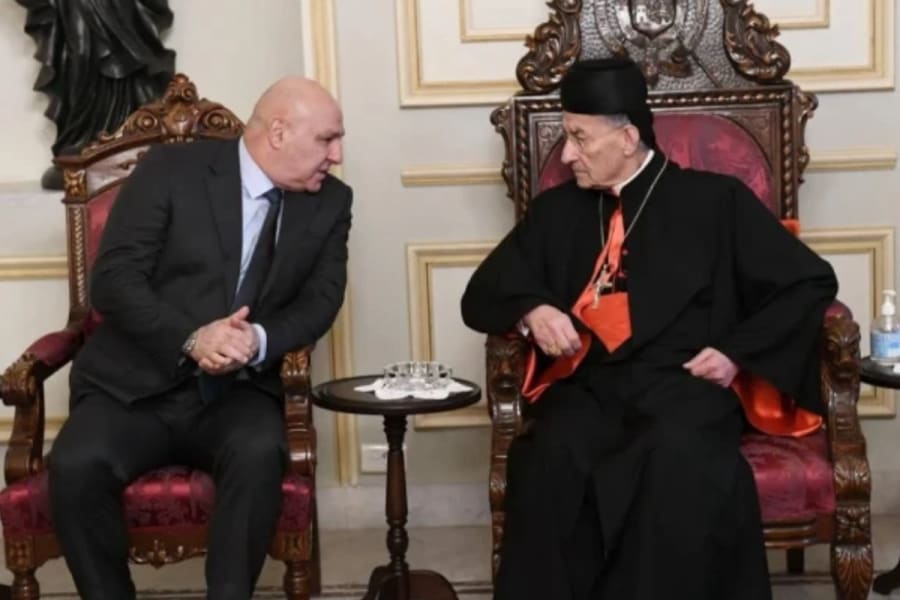Lebanon’s Christian President Joseph Aoun

In a significant political breakthrough, Lebanon's parliament elected army commander Joseph Aoun as the country's 14th president in January 2025, ending a presidential vacuum that had lasted more than two years. The 61-year-old Maronite Christian military leader ascended to the presidency with broad domestic support and international backing, particularly from the United States and Saudi Arabia.
Aoun's path to the presidency was forged through his distinguished military career and reputation for maintaining stability during Lebanon's most turbulent times. Born in 1964 in Sin el-Fil, a northern suburb of Beirut, he joined the Lebanese Armed Forces (LAF) as a cadet officer in 1983 during the Lebanese Civil War. His military education included specialized training in the United States, where he participated in counterterrorism programs that would later prove very helpful in his career.
In 2017, as commander of the Lebanese Armed Forces, Aoun faced one of his most significant challenges: the Qalamoun offensive. This complex military operation targeted Islamic State (ISIS) and Hay'at Tahrir al-Sham (HTS), fighters who had established strongholds in the mountainous terrain between Syria and Lebanon. While Hezbollah and the Syrian Army conducted operations on their side of the border, Aoun led the Lebanese Armed Forces in a carefully coordinated but officially separate campaign. The offensive proved successful, resulting in the clearing of terrorist groups from Lebanese territory and the restoration of state control over the border region for the first time in six years.
Aoun's relationship with Hezbollah remains complex. While he has maintained professional communication with the powerful Shiite group, he has consistently advocated for state sovereignty. In his inaugural speech, he emphasized the state's exclusive right to possess weapons, a clear reference to Hezbollah's controversial armed status. This stance reflects his broader vision of strengthening Lebanese state institutions and reducing the influence of non-state actors.
The new president's immediate plans for Lebanon focus on several urgent priorities. He has pledged to initiate parliamentary consultations to swiftly select a prime minister, implement judicial reforms, and begin the massive task of reconstructing areas damaged during the 2024 Israeli invasion. His agenda also includes strengthening state institutions, combating corruption, and developing a comprehensive defense strategy that encompasses diplomatic, economic, and military aspects.
Aoun's presidency is deeply rooted in Lebanon's complex confessional political system, which allocates key government positions among the country's major religious communities. As a Maronite Christian, his election continues the tradition of Lebanon's presidency being reserved for a member of this community, while the prime minister must be a Sunni Muslim and the parliament speaker a Shiite Muslim.
The Maronite Christians, who trace their origins to the early Christian church and maintain communion with Rome while preserving their own liturgy and traditions, have historically played an important role in Lebanese politics. Despite demographic changes that have reduced their proportion of the population, they remain influential in the country's political and economic spheres.
Lebanon's demographic composition has evolved significantly over the decades, with Shiite Muslims now forming the largest religious group, followed by Sunni Muslims and Christians. However, official census figures are not published to maintain the delicate sectarian balance. The Maronites' guaranteed hold on the presidency, established by the 1943 National Pact and reaffirmed by the 1989 Taif Agreement, remains a key element of Lebanon's political structure.
Aoun assumes leadership at a critical juncture in Lebanon's history. The country faces multiple challenges, including:
- Recovering from the devastating economic crisis that has pushed millions into poverty
- Implementing the terms of a ceasefire agreement with Israel that requires careful management in southern Lebanon
- Addressing the complex issue of Hezbollah's weapons while maintaining national unity
- Rebuilding infrastructure damaged during recent conflicts
- Reforming state institutions to combat endemic corruption
International support appears strong for Aoun's presidency. The United States, which has provided over $2.5 billion in support to the LAF since 2006, sees him as a stabilizing force. Saudi Arabia and other Gulf states have also expressed support, viewing him as capable of balancing various regional interests.
Aoun's military background and reputation for integrity may serve him well in navigating Lebanon's complicated political situation. His emphasis on state institutions and the rule of law suggests a vision of Lebanon where sectarian interests are subordinate to national ones. However, he faces significant challenges in implementing this vision, particularly given the entrenched nature of Lebanon's sectarian political system and the influence of various non-state actors.
The success of Aoun's presidency will largely depend on his ability to build consensus among Lebanon's diverse political factions while maintaining international support for his reform agenda. His military experience and relationships with various international powers could prove valuable assets as he works to rebuild Lebanon's institutions and restore stability to a country that has endured multiple crises in recent years.
The Maron Way
The Maronite Church was named after St. Maron, a Syrian hermit who lived in the fourth and fifth centuries. Maronites believe that salvation is achieved through Jesus Christ, as many other Christians believe.
While Maronites, do not explicitly use the phrase "born again" in the same way some Protestant denominations do, their theology does encompass the concept of a spiritual rebirth through the sacrament of baptism, where individuals are considered to be "new creations" in Christ, signifying a transformation in their relationship with God; essentially aligning with the core idea of being "born again" through faith and grace.
God gave Saint Maron the gift of healing to heal the sick and cast out demons. He was born in Cyrrhus, a small town near Antioch, Syria. He spent his life teaching, ministering, and living an ascetic life of prayer, fasting, and vigil. He converted a pagan temple into a Christian church and founded many monasteries. Saint Maron died around 410 A.D., and his disciples continued his mission.
The Maronite movement reached Lebanon when St. Maroun’s first disciple Abraham of Cyrrhus who was called the Apostle of Lebanon, realized that there were many non-Christians in Lebanon, so he set out to convert them to Christianity by introducing them to the way of St. Maroun. During the Islamic conquest, Maronites retreated to the mountains in Lebanon. The Islamic conquest of Lebanon occurred during the 7th century, when the Arab Muslims took the region from the Byzantine Empire.

Aurthur is a technical journalist, SEO content writer, marketing strategist and freelance web developer. He holds a MBA from the University of Management and Technology in Arlington, VA.
You might also like to read this:
















